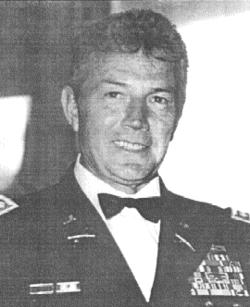- Richard J. Meadows
-
Richard J. Meadows 
Major Richard J. MeadowsBorn June 16, 1931 Died July 29, 1995 (aged 64) Allegiance United States of America Service/branch United States Army Years of service 1947-1977 Rank Major Battles/wars Korean War
Vietnam War
Operation Ivory CoastAwards Distinguished Service Cross
Silver Stars (2)
Bronze Star with V Device
Air Medal
Legion of Merit
Combat Infantryman Badge
Master Parachutist badge
Ranger Tab
Scuba BadgeMajor Richard J. Meadows (June 16, 1931 – July 29, 1995) was a U.S. Army Special Forces officer who saw combat in U.S. wars from Korea to the Iran Hostage Rescue mission in 1980. He was a pivotal player in the creation of the modern U.S. Army Special Forces.
Meadows enlisted in the Army at age 15. He first saw combat in Korea and was, by age 20, the youngest Master Sergeant in the Army at that time. In 1953, he entered the U.S. Army Special Forces and remained active in them or the Rangers until his retirement in 1977. His participation in the Iran Hostage Rescue mission came after his official retirement.
In 1960, Meadows was one of the first U.S. Army officers to participate in an exchange program with the British Special Air Service special forces unit. Meadows completed SAS training, was an acting troop leader for 12 months, and participated in a field combat operation with his unit. It is widely believed that Meadows' SAS experience helped form the basis for future US Army special forces selection, training, and organizational structures.
While assigned to the 8th Special Forces Group in Panama, MSgt. Meadows volunteered for a tour in Vietnam. At the end of his first tour, serving in the Military Assistance Command, Vietnam - Studies and Observations Group, Meadows received a direct commission as a captain on April 14, 1967.
On Nov 21, 1970 Capt. Meadows was the team leader for the initial assault team in the Son Tay prison camp raid (see Operation Ivory Coast). This 14-man team (plus pilots), code-named Blueboy, intentionally crash-landed an HH-3 helicopter right in the middle of the prison camp to achieve maximum surprise. One team member was injured in the landing (broken ankle). The remaining team members executed their mission without further casualties. However, much to Meadows' disappointment, the prison camp had moved all its captives weeks earlier.
In the mid-1970s, Meadows was a key figure in the founding of the US Delta Force special operations and hostage rescue force.
Major Meadows retired in 1977.
In 1980, Major Meadows returned to service as a special consultant and performed a covert reconnaissance of the U.S. Embassy in Tehran prior to and during Operation Eagle Claw, better known as the Iran Hostage Rescue mission. That mission ended in a major accident at a ground refueling point in the Iran desert, and was aborted. Documents found at the crash site compromised both the mission and Meadows' cover in Iran. Under cover as a foreign businessman, Meadows escaped Iran aboard a commercial flight.
In 1995, Meadows was diagnosed with and subsequently died of leukemia. It is contended by many in the Special Forces community that, had the contents of Meadows' military record been disclosed, he would have been awarded the Medal of Honor. However, the majority of Meadows' covert roles in Vietnam working with the CIA's Special Activities Division, remain undisclosed.
Contents
Military awards
His military awards and decorations include the Distinguished Service Cross, two Silver Stars, Bronze Star with Valor Device, Air Medal, Legion of Merit, Meritorious Service Medal, Joint Service Commendation Medal, three Army Commendation Medals, Combat Infantryman Badge, Master Parachutist badge, Glider Badge, Ranger Tab, Scuba Badge, and numerous foreign awards.
 Distinguished Service Cross
Distinguished Service Cross Silver Star with oak leaf cluster
Silver Star with oak leaf cluster Legion of Merit
Legion of Merit Bronze Star with Combat "V" for Valor
Bronze Star with Combat "V" for Valor Air Medal
Air Medal Meritorious Service Medal
Meritorious Service Medal Joint Service Commendation Medal
Joint Service Commendation Medal Army Commendation Medal with two oak leaf cluster
Army Commendation Medal with two oak leaf cluster
Just before his death, in July, 1995, Meadows was told he was to be presented with the Presidential Citizens Medal by President Clinton.[1]
In fiction
Tom Clancy's Novel "Without Remorse" features a prison camp raid that is heavily based on the Song Tay raid and main character John Clark's career as an intelligence officer is also very similar to that of Major Meadows career.
See also
- Operation Eagle Claw, the Iran hostage crisis raid
- Operation Ivory Coast, the Son Tay prison camp raid
- Delta Force
- United States Army Special Forces
- U.S. Army Rangers
- List of Korean War veterans who are recipients of the Bronze Star
References
- "Richard J. Meadows". Find a Grave. http://www.findagrave.com/cgi-bin/fg.cgi?page=gr&GRid=11421016. Retrieved 2008-02-19.
- Specialoperations.com biography
- Ranger Hall of fame biography
- Inside Delta Force, Eric L. Haney, [1]
Categories:- United States Army officers
- Members of the Special Forces of the United States
- American military personnel of the Korean War
- American military personnel of the Vietnam War
- American spies
- Recipients of the Combat Infantryman Badge
- Recipients of the Ranger tab
- Recipients of the Distinguished Service Cross (United States)
- Recipients of the Silver Star
- Recipients of the Legion of Merit
- Recipients of the Bronze Star Medal
- Recipients of the Vietnamese Cross of Gallantry
- 1931 births
- 1995 deaths
- Recipients of the Air Medal
- People from Alleghany County, Virginia
- Presidential Citizens Medal recipients
Wikimedia Foundation. 2010.
